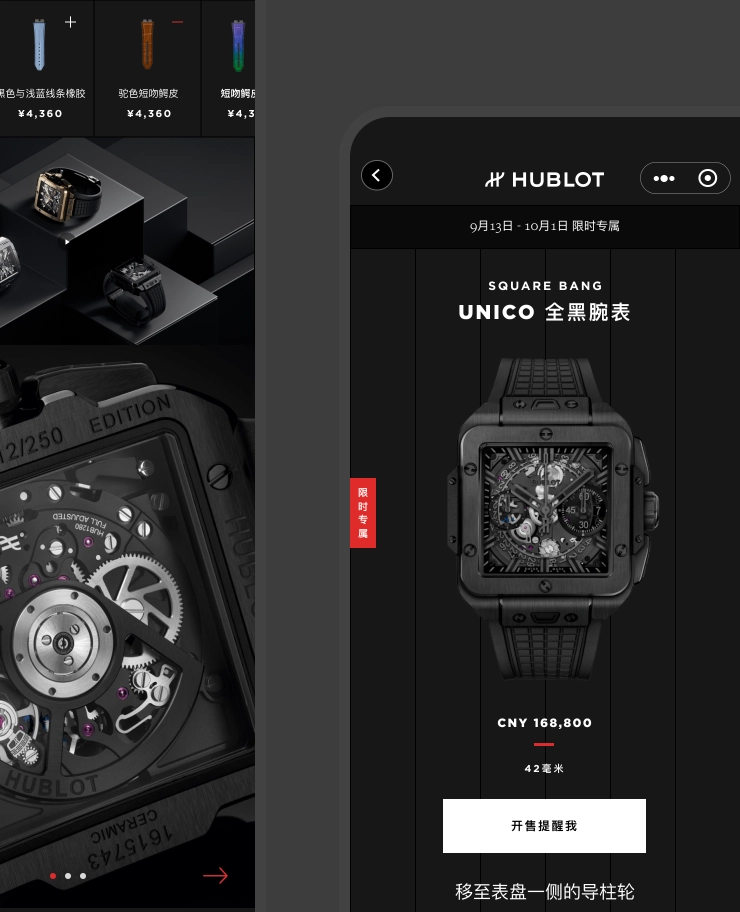13 Popular Chinese E-commerce Platforms You Should Know In 2026
January 15th, 2026 · Written by Anna Kondrasheva

Contents
According to the International Trade Administration China is the largest e-commerce market in the world, generating almost 50 % of all global transactions. China’s e-commerce market is projected to continue expanding at a compound annual growth rate (CAGR) of 9.9 percent from 2024 to 2028, reaching CNY 25.4 trillion ($3.6 trillion) by 2028.. It is a highly lucrative market that offers immense opportunities for businesses looking to expand their reach and increase their revenue.
The Chinese ecommerce platform market is continuously evolving with the emergence of new players and significant changes to established players who are adapting to the latest ecommerce trends.
By understanding these platforms, brands can tailor their marketing strategies and product offerings to reach the specific audiences that frequent each platform. Brands can also optimize their product listings, pricing strategies, and promotional efforts to better compete in these marketplaces.
Overall, having a solid understanding of the leading ecommerce platforms in China is essential for brands looking to succeed in the Chinese market and capitalize on the immense opportunities it offers.
This article presents a comprehensive overview of China's 13 most popular ecommerce platforms, utilizing data from reputable sources such as SimilarWeb and Statista, as well as official reports from the platforms themselves.
While there may be slight discrepancies in the absolute numbers, the information compiled accurately represents each platform's size, popularity, estimated web traffic (including mobile app and mini-program data, where available), unique features, and user demographics. By utilizing this data, readers will gain valuable insight into each platform's unique strengths and potential for business success.
Need an e-commerce platform?
Partner with Digital Creative to launch an optimized, on-brand ecommerce presence tailored to your unique needs.
1. TaoBao (淘宝)
Website: www.taobao.com
Monthly Active Users: 982.78 million (as of Sep 2025)
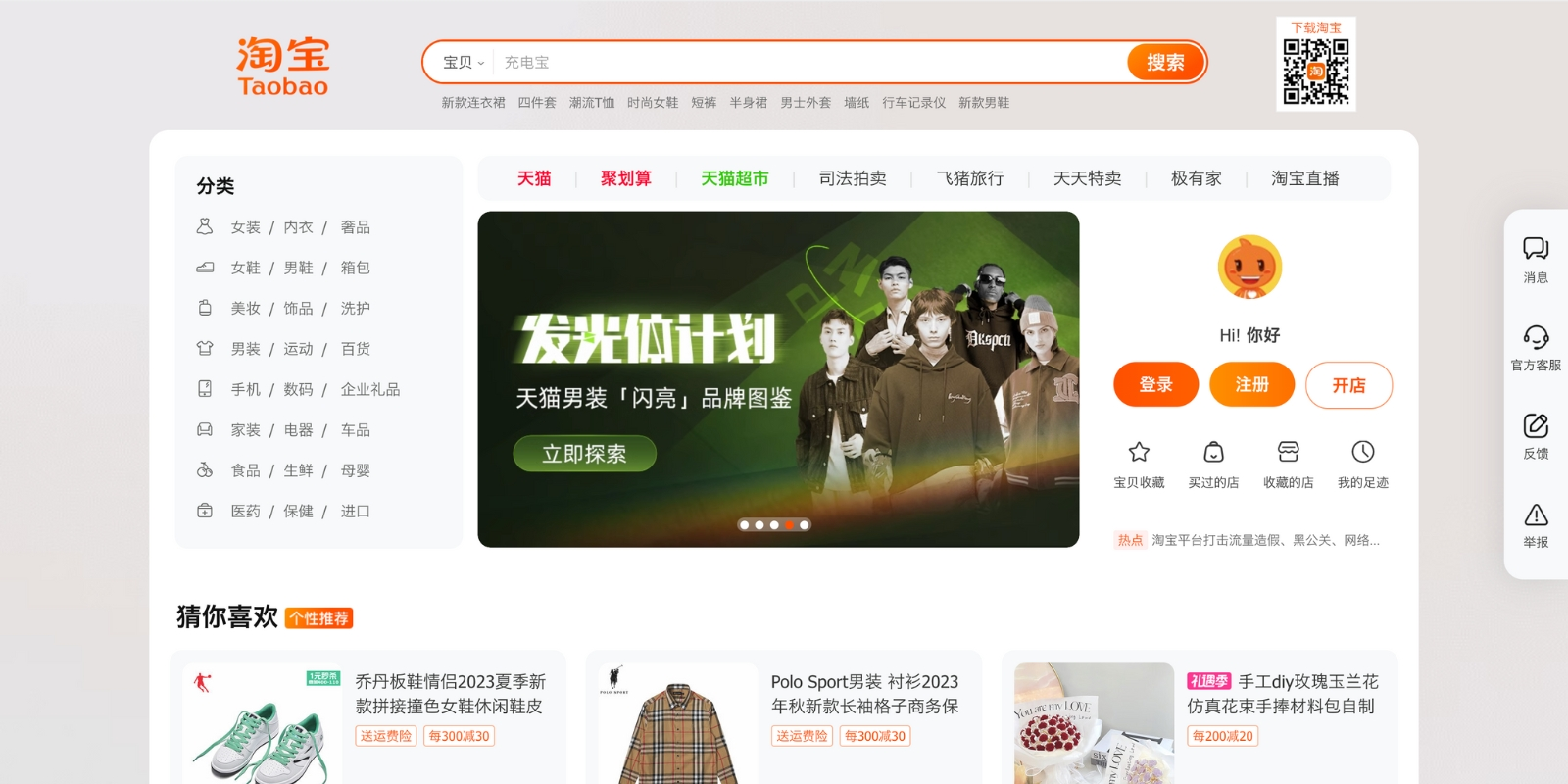
Taobao (淘宝) (which directly translates to 'seeking treasure') is China's largest C2C and B2C ecommerce marketplace. It was launched in 2003 by Alibaba Group as a platform for individuals and small business owners to sell products through their own online "stores." Taobao Marketplace is for individuals and small to medium businesses, while Tmall (including Tmall Global) caters to medium to large businesses.
What Is Special About Taobao
What makes Taobao stand out as an online shopping website is its wide range of products, catering to nearly every type of consumer with a fairly equal gender ratio of users. It also provides a platform for young entrepreneurs and small businesses to connect with consumers from the Greater China Region.
With multiple sellers for each product, buyers can easily compare prices for the same or similar items and cross-research products using the information on sellers, comments, complaints, and ratings.
Taobao's impact on the Chinese e-commerce market was reinforced with the debut of AliPay, one of the country's two major payment systems.
Taobao and Tmall were the first to capitalize on “Singles Day” holiday in 2009 by turning it into a massive shopping festival with discounts, leading to a shopping frenzy.
2. PinDuoDuo (拼多多)
Website: www.pinduoduo.com
Monthly Active Users: 707.56 million (as of Sep 2025)
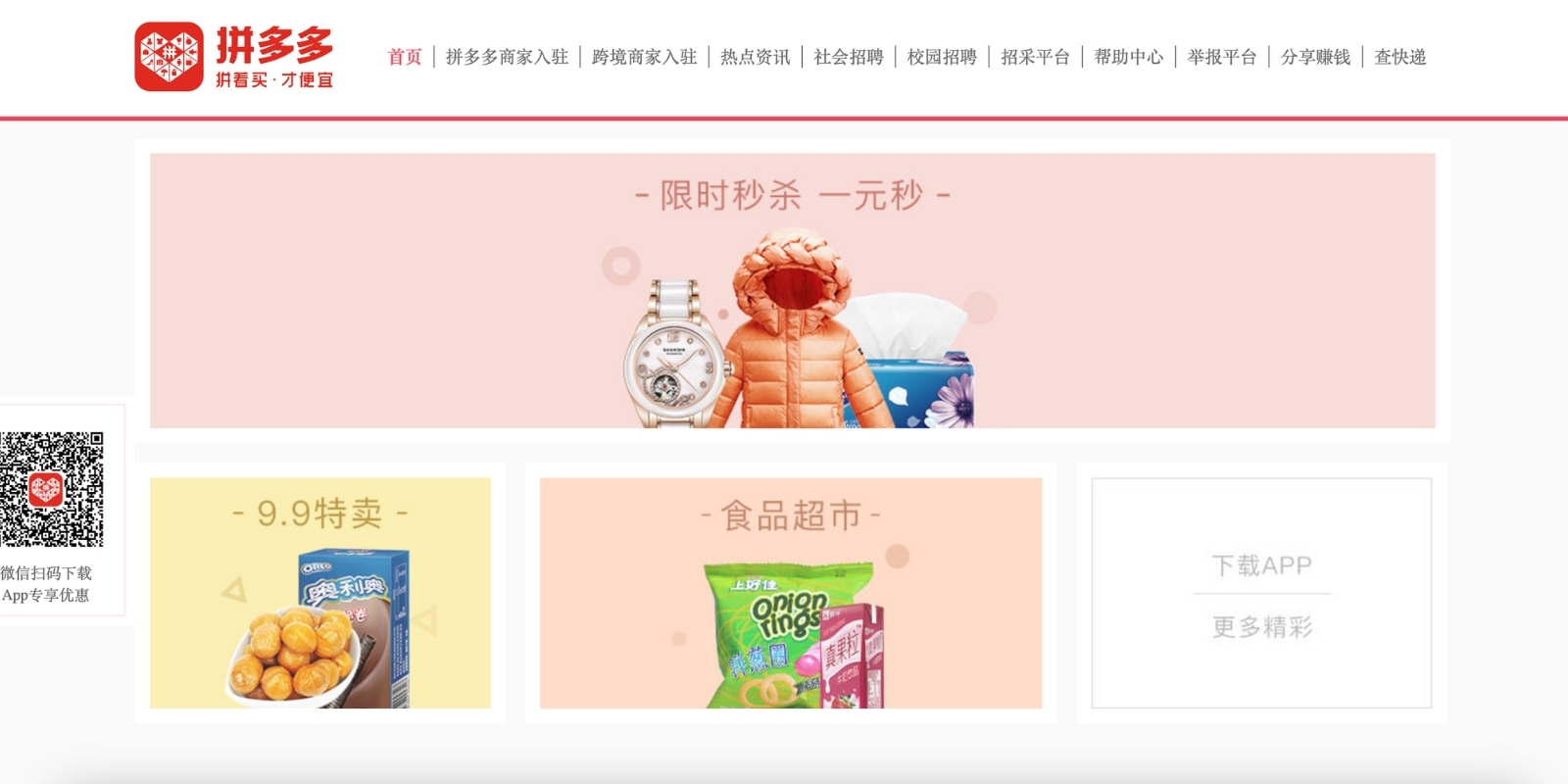
Pinduoduo, a Chinese ecommerce giant, was established in 2015 by Colin Huang. The company started operations as an online retailer specializing in agriculture products before evolving into a third-party platform. Pinduoduo is now a one-stop shop that connects merchants and customers across diverse product categories. The company's innovative business model and unique approach to ecommerce have helped to differentiate it from other players in the market.
What Is Special About Pinduoduo
Pinduoduo is known for its highly attractive prices with discounts of up to 90%. What sets Pinduoduo apart from other ecommerce platforms is its unique and free "team purchase" service. Instead of a search bar or conventional methods of finding specific products, Pinduoduo groups discounted products by categories and displays them to users in a virtual bazaar-like format where every page is dynamically personalized.
Users can scroll through and explore different products, and the fun interactive group buying experience is central to this model. Pinduoduo's viral popularity can be attributed to its social sharing feature that allows users to share product information on social networking platforms like WeChat and QQ messenger apps. Users can take advantage of group buying deals and lower prices by forming a shopping team and inviting their contacts to join.
3. JD (京东)
Website: www.jd.com
Monthly Active Users: 610.25 million (as of Sep 2025)
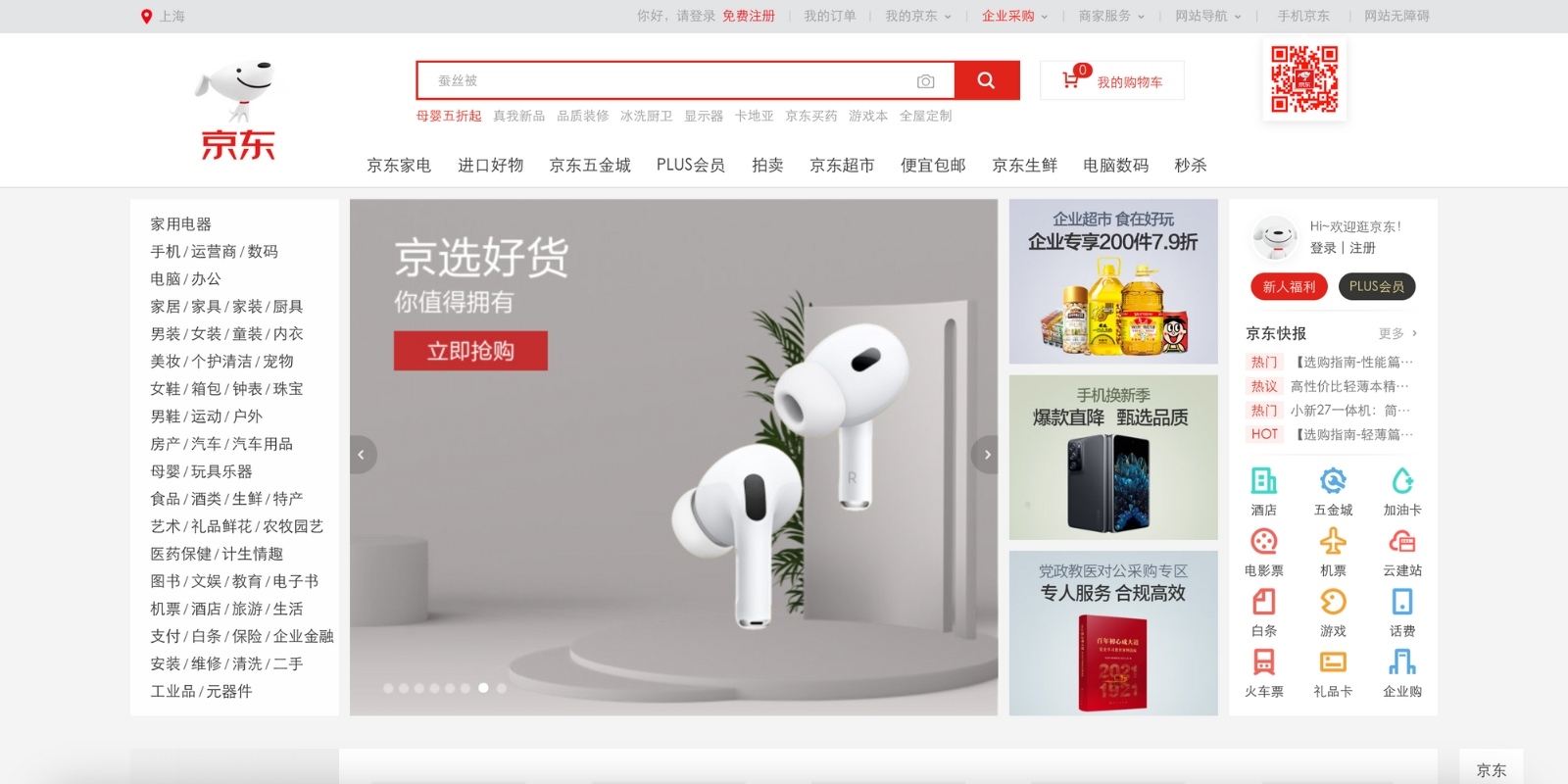
Jingdong is one of the largest e-commerce companies in China. It was founded in 1998 as an online magneto-optical store by Richard Liu Qiangdong. It has since expanded to become a comprehensive online shopping mall offering a wide range of products, including electronics, clothing, food, and cosmetics. The company has its own delivery network and warehouses, ensuring fast and reliable delivery nationwide.
What Is Special About JD
JD.com is dedicated to building an efficient and reliable logistics system. The company has achieved significant milestones, such as creating the world’s first fully automated warehouse and developing autonomous delivery vehicles.
JD invests heavily in R&D, particularly in areas like smart logistics, artificial intelligence, and virtual reality. It aims to offer a trustworthy retail platform to customers worldwide, construct a full range of distribution channels, and build an international cross-border trading platform.
Intellectual property is also a valuable asset for JD.com, and the company takes protecting its innovation and intellectual property rights seriously.
4. Douyin (抖音)
Website: www.douyin.com
Monthly Active Users: 936.41 million (as of Sep 2025)
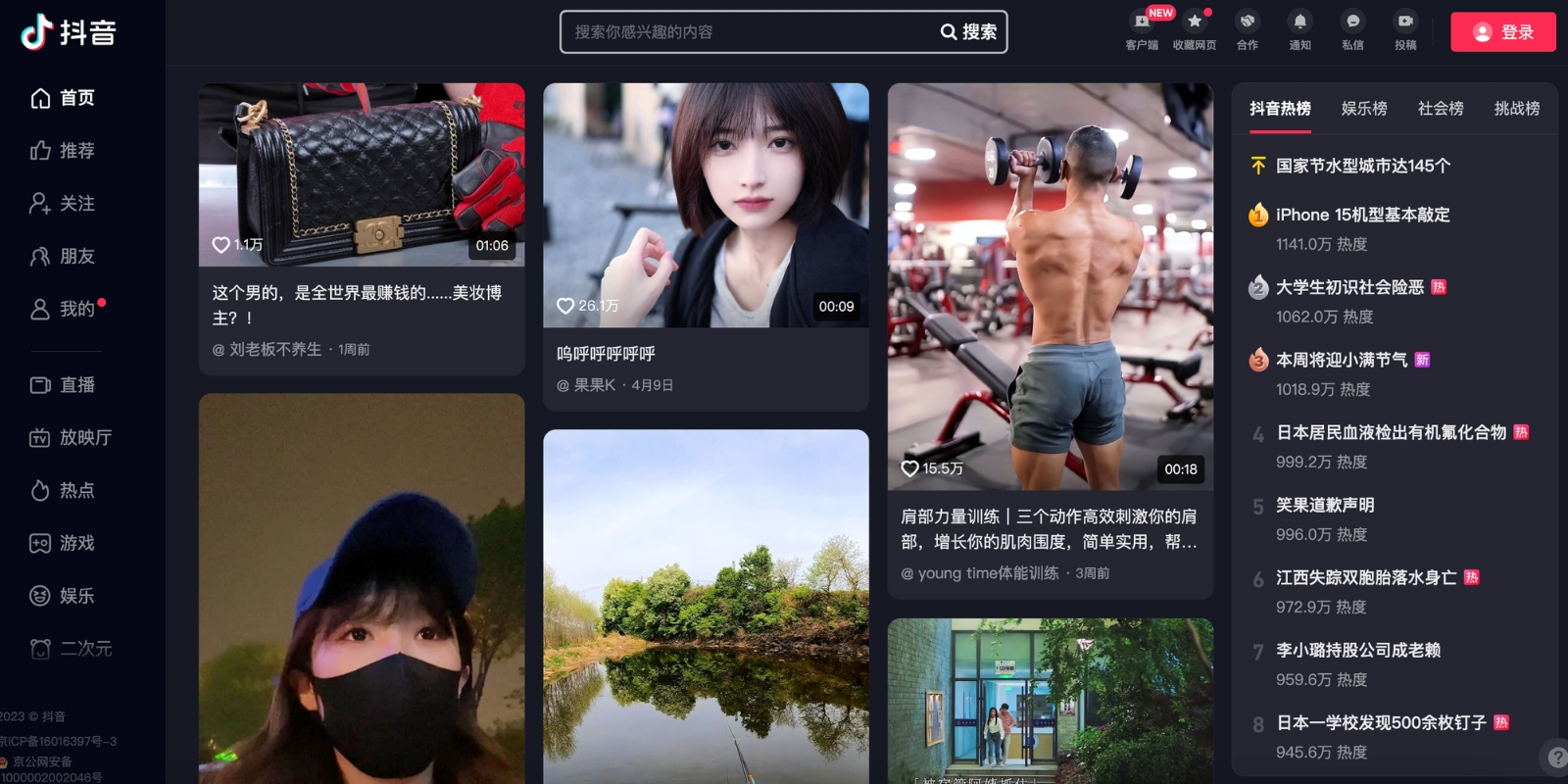
Douyin is a social media app developed by ByteDance in 2016 that allows users to create and share short videos with various filters and effects. However, by 2018 Douyin had started transitioning into an ecommerce platform, allowing creators to add third-party links to products and stores through a shopping cart icon that led directly to those shops.
In the same year, Douyin launched Douyin Stores, a native ecommerce system, to sell products directly within the app. Douyin continued to push its native ecommerce platform by raising commissions on sales from third-party platforms and blocking links from live commerce streams to third-party platforms in 2020. With tripled gross merchandise value since 2020, Douyin has become an essential player in the Chinese ecommerce market.
What Is Special About Douyin ecommerce
Douyin's eCommerce platform stands out for its ability to combine social media and shopping seamlessly. With a strong user base and advanced algorithm system, Douyin's "interest-based eCommerce" uses data analysis technology to suggest products that match users' interests and needs. By allowing users to complete their shopping experience by watching videos, sharing products, placing orders, and making purchases within the app, Douyin has created a unique native shopping experience.
5. KuaiShou (快手)
Website: www.kuaishou.com
Monthly Active Users 731.1 million (as of Q3 2025)

Kuaishou (快手) is one of China’s largest short-video and livestreaming platforms, widely known for its strong community culture and deep penetration in lower-tier cities and rural areas. It was founded in 2011 and has evolved from a simple GIF-making tool into a full-fledged content and commerce ecosystem.
Unlike platforms that emphasize highly curated or entertainment-first content, Kuaishou is built around everyday life. Its users frequently share raw, authentic moments—from farming and cooking to small business operations—creating a sense of closeness and trust between creators and viewers.
What Is Special About Kuaishou
What truly differentiates Kuaishou is its community-driven model. The platform is famous for its “老铁文化” (lǎo tiě wén huà), a term that reflects the strong, loyal relationships between creators and followers. This trust-based relationship makes Kuaishou especially effective for livestream commerce.
Roughly 60% of Kuaishou’s users come from third- and fourth-tier cities, and its audience spans a wider age range compared to platforms like Douyin. Middle-aged and older users are more active here, making Kuaishou a powerful channel for daily necessities, affordable goods, and practical products.
Kuaishou integrates e-commerce directly into its content flow through livestreams and its in-app marketplace, Kuaishou Shop. Sellers often rely less on celebrity influencers and more on long-term creator trust, which leads to higher repeat purchases and stronger user loyalty.
While its interface and core features may look similar to Douyin at first glance, Kuaishou serves a fundamentally different demographic and consumption mindset—one that prioritizes authenticity, relationships, and value over trend-driven discovery.
6. XiaoHongShu (小红书)
Website: www.xiaohongshu.com
Monthly Active Userss: 242 million (as of May 2025)
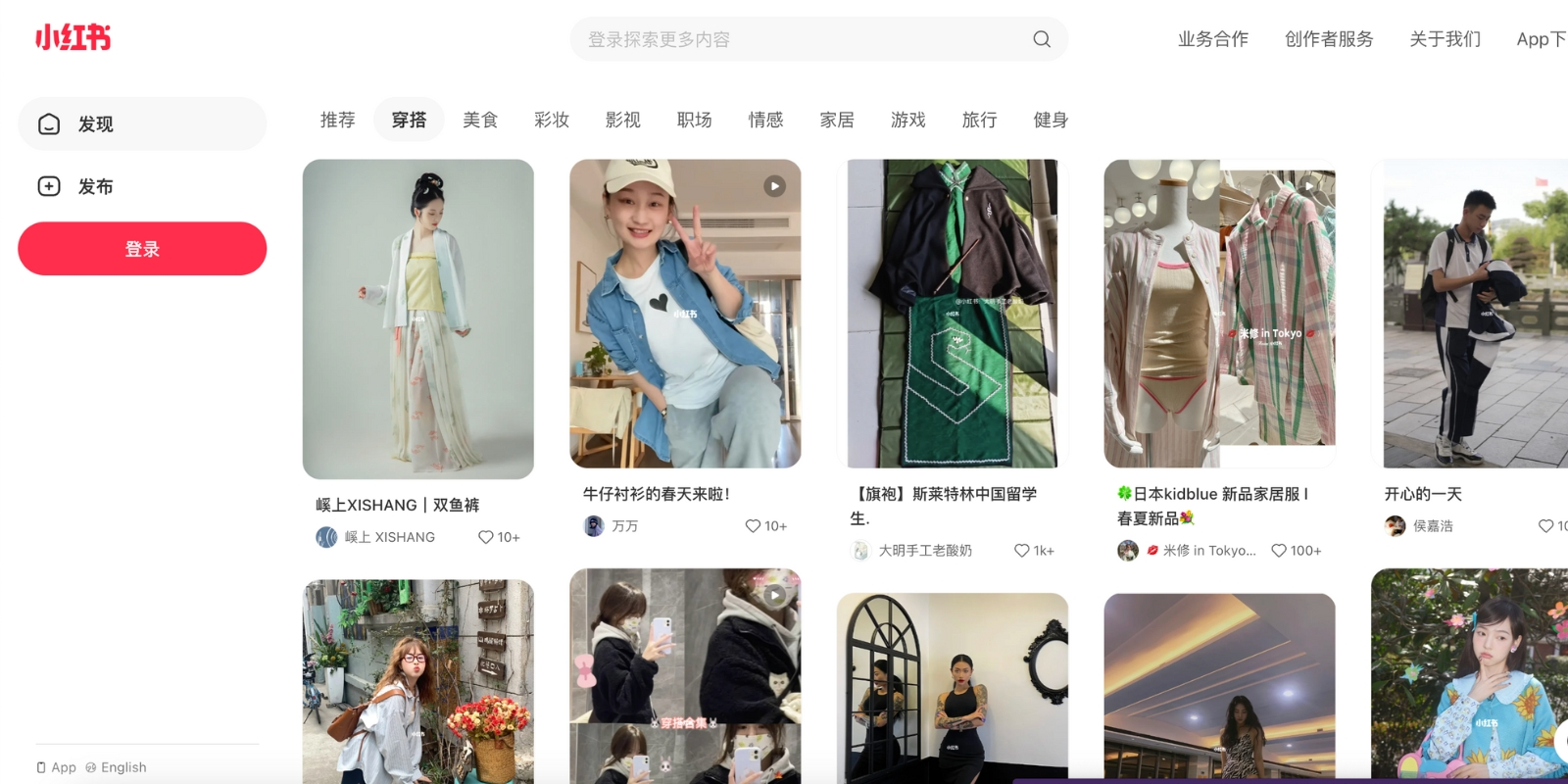
Xiaohongshu, also known as Little Red Book or RED Note, is a social e-commerce platform founded in China in 2013 as China’s answer to Instagram. It started as a platform for sharing travel and lifestyle tips but quickly evolved into an e-commerce platform for domestic and international brands. Xiohongshu is particularly popular with millennials and Gen Z, with more than two-thirds of its users being female.
What Is Special About Xiaohongshu
Xiaohongshu has a content-driven approach to e-commerce, where users create and share content about products, brands, and lifestyles. It emphasizes user-generated content, with many product reviews and recommendations coming from its active community of users. This creates a strong sense of trust and credibility for consumers.
Users can share their shopping experiences and product reviews with friends, follow influencers and celebrities, and purchase products directly within the app. The platform has a large user base of young, affluent Chinese consumers interested in high-quality products and overseas brands.
7. Tmall (天猫)
Website: www.tmall.com
Monthly Active Users: 59.05 million (as of Sep 2025)
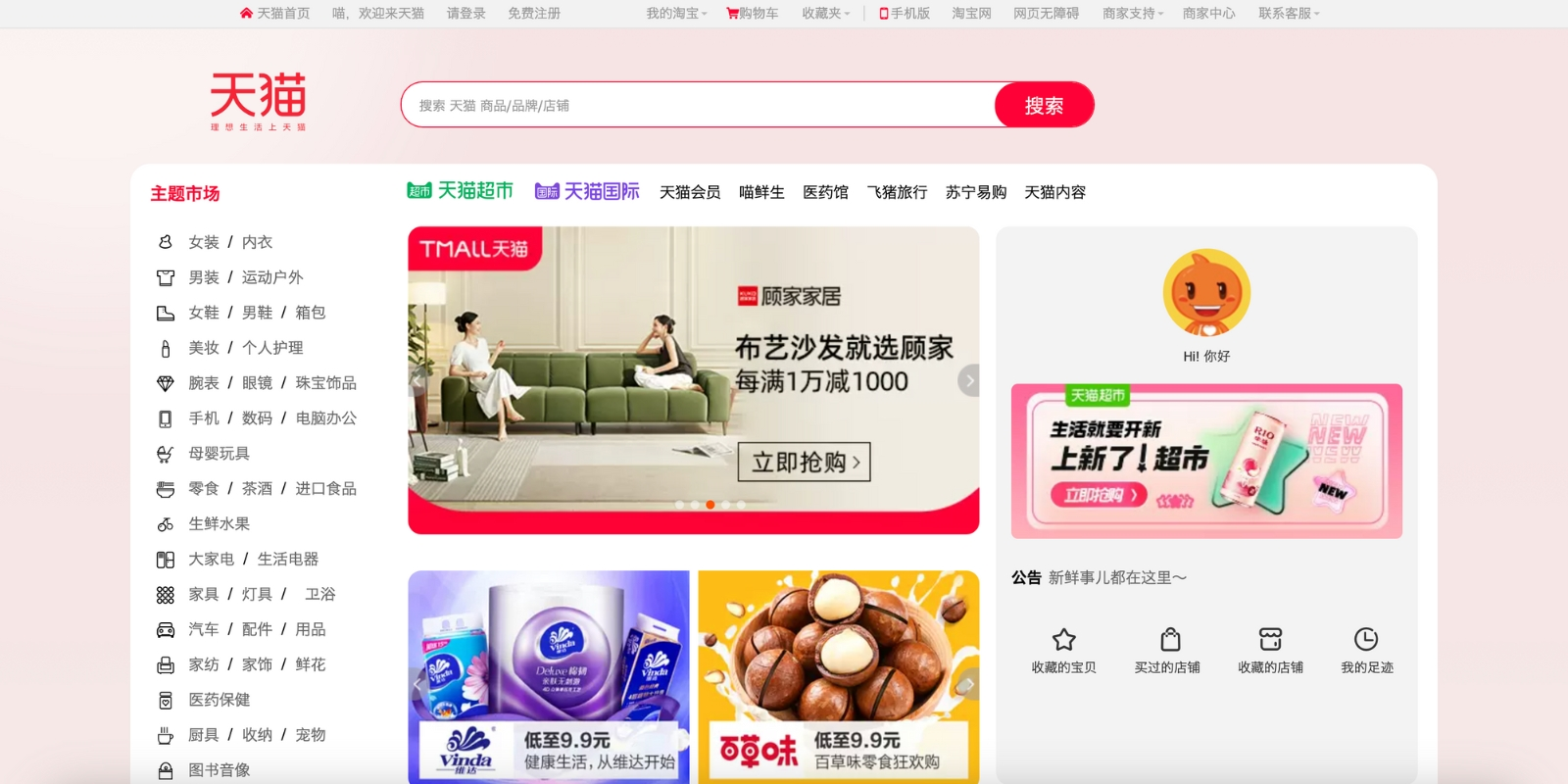
Tmall was first launched in 2008 by Alibaba Group as a spin-off of Taobao. In 2011 Tmall became a separate platform with its independent domain. Tmall is designed to sell branded products to consumers in mainland China. Tmall has become one of China's largest and most trusted B2C e-commerce platforms.
What Is Special About Tmall
Tmall's unique selling point is its focus on brand authenticity and quality. Tmall only allows official brand stores to operate on its platform, ensuring that customers can trust the authenticity of the products they purchase. Tmall also provides various tools and services to help brands enhance their presence on the platform, including advertising, personalization, interactive live cards, and data analysis services.
Like Taobao, Tmall offers a wide range of product categories but focuses on high-end and luxury items, making it a preferred destination for consumers seeking high-quality products.
8. 1688 (阿里巴巴)
Website: www.1688.com
Monthly Active Users: 61.92 million (as of Sep 2025)
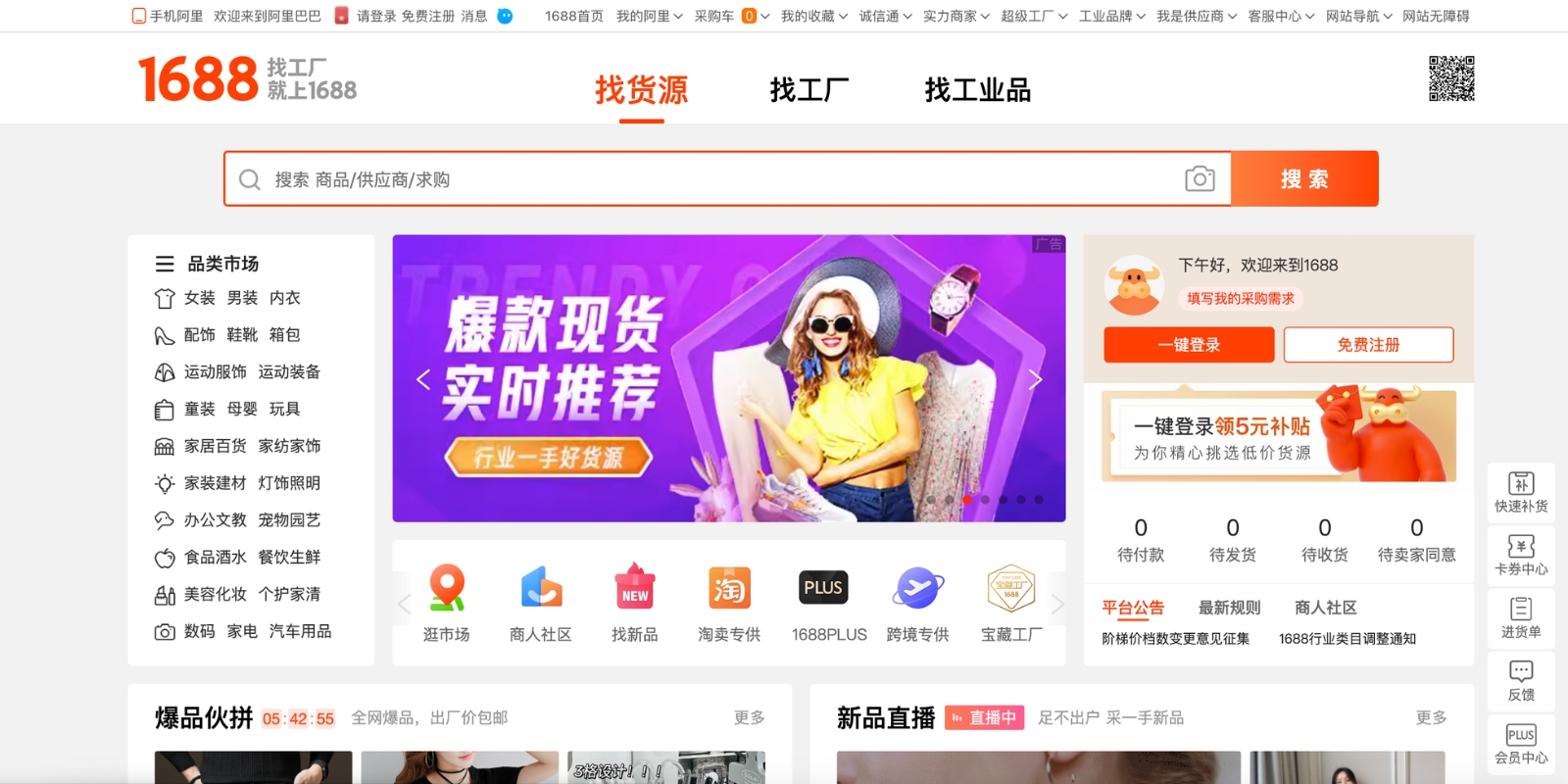
1688.com is a B2B e-commerce platform owned by Alibaba Group (1688 sounds similar to ‘Alibaba’ pronounced in Mandarin Chinese). The platform was launched in 2010 and has since grown to become one of China's largest B2B platforms, with millions of registered users and a wide range of products available for purchase.
Unlike Alibaba.com, which mainly focuses on serving foreign buyers, 1688 is designed to help domestic Chinese buyers and sellers.
What Is Special About 1688
One of the unique aspects of 1688.com is that it offers a comprehensive supply chain management system, including logistics and financing services, making it easier for businesses to manage their procurement processes from start to finish. Additionally, the platform allows users to negotiate prices with suppliers directly and offers a variety of payment options, including online banking and even escrow services.
9. Vip (唯品会)
Website: www.vip.com
Monthly Active Users: 69.56 million [(as of Sep 2025)](https://www.questmobile.com.cn/research/report/1985984354598359042
Vip.com (former Vipshop) was founded in 2008 and is an online discount retailer that sells a wide range of products, including fashion, home goods, and electronics.
Vip.com’s business model is based on flash sales, meaning that products are only available for a limited time at a discounted price—Vip.com partners with over 20,000 brands to offer these flash sales.
The company has a proven track record of success in China and is now expanding into Southeast Asia.
In 2022 it launched in Singapore and released its app in several other countries in the region. Vipshop is hoping to replicate its success in China in Southeast Asia.

10. Poizon (得物)
Website: https://www.dewu.com/
Monthly Active Users: 68.07 million (as of Sep 2025)
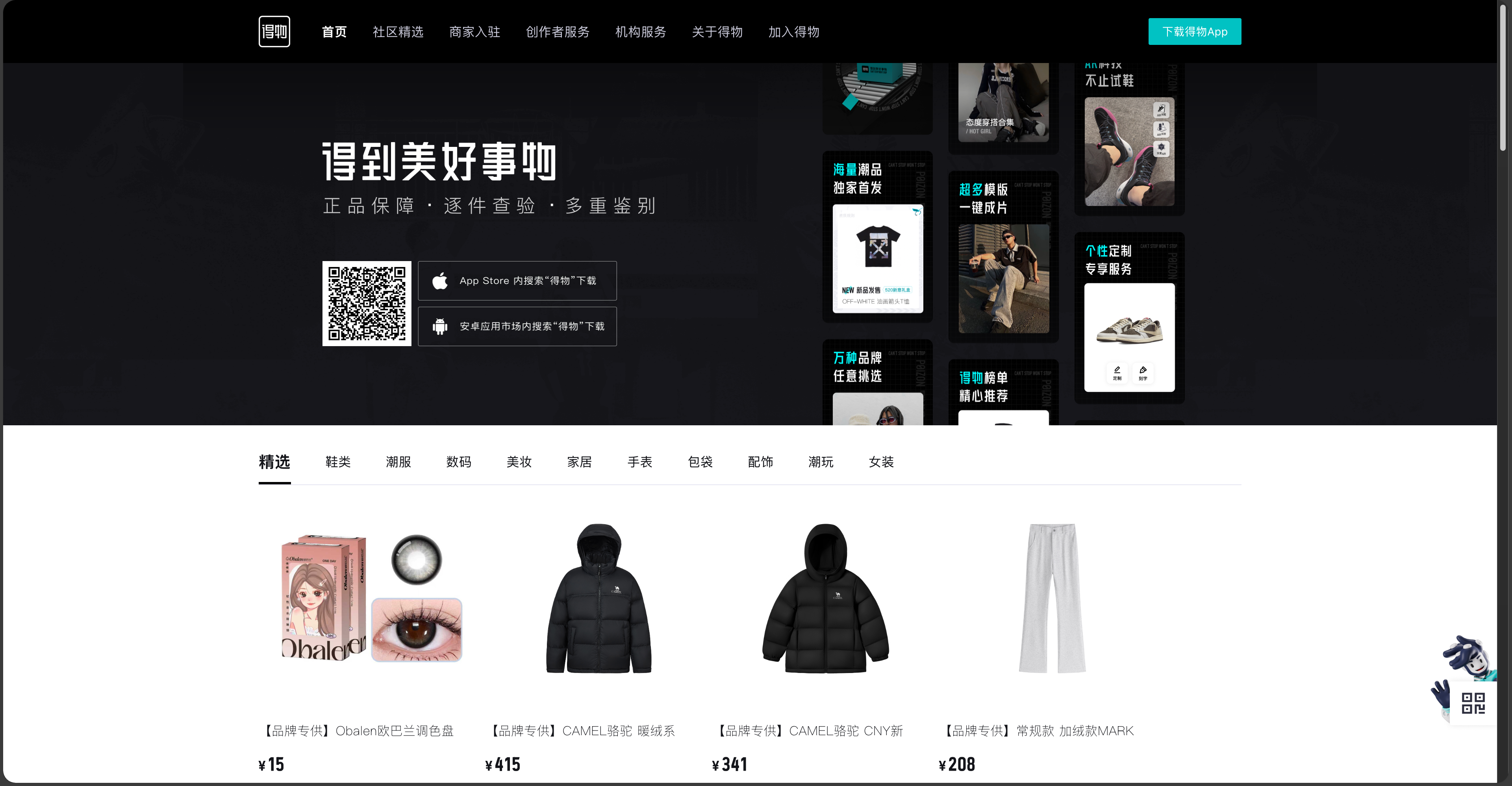
At first glance, Poizon (known as Dewu in China) feels like a mix of an e-commerce store and a social media feed for trendsetters. Unlike general platforms like Taobao, Poizon has carved out a niche as the leading marketplace for authentic sneakers, streetwear, and luxury goods. Poizon is the playground for China’s Gen Z and urban youth. Over 80% of its users are young people born in the 90s and 00s who prioritize brand authenticity and "hype" culture.
You’ll notice the app interface emphasizes high-quality visuals and a clean, premium aesthetic. You’ll find a "Community" tab for outfit sharing (OOTD), a vast catalog of limited-edition items, and a dedicated section for professional authentication services.
In terms of content culture, Poizon is centered on "Flexing" and Lifestyle. Users don't just shop; they showcase their latest purchases and discuss the latest trends in street fashion. The platform’s core value proposition is its rigorous authentication process. Every item sold is inspected by experts to ensure it isn't a counterfeit before it reaches the customer.
Despite being an e-commerce platform, Poizon also functions as a trend encyclopedia. It has transformed from a sneaker community into a comprehensive lifestyle platform offering everything from high-end watches to branded electronics, all tied together by the promise of authenticity.
11. YiHaoDian (一号店)
Website: www.yhd.com
Monthly Active Users: No public data available.
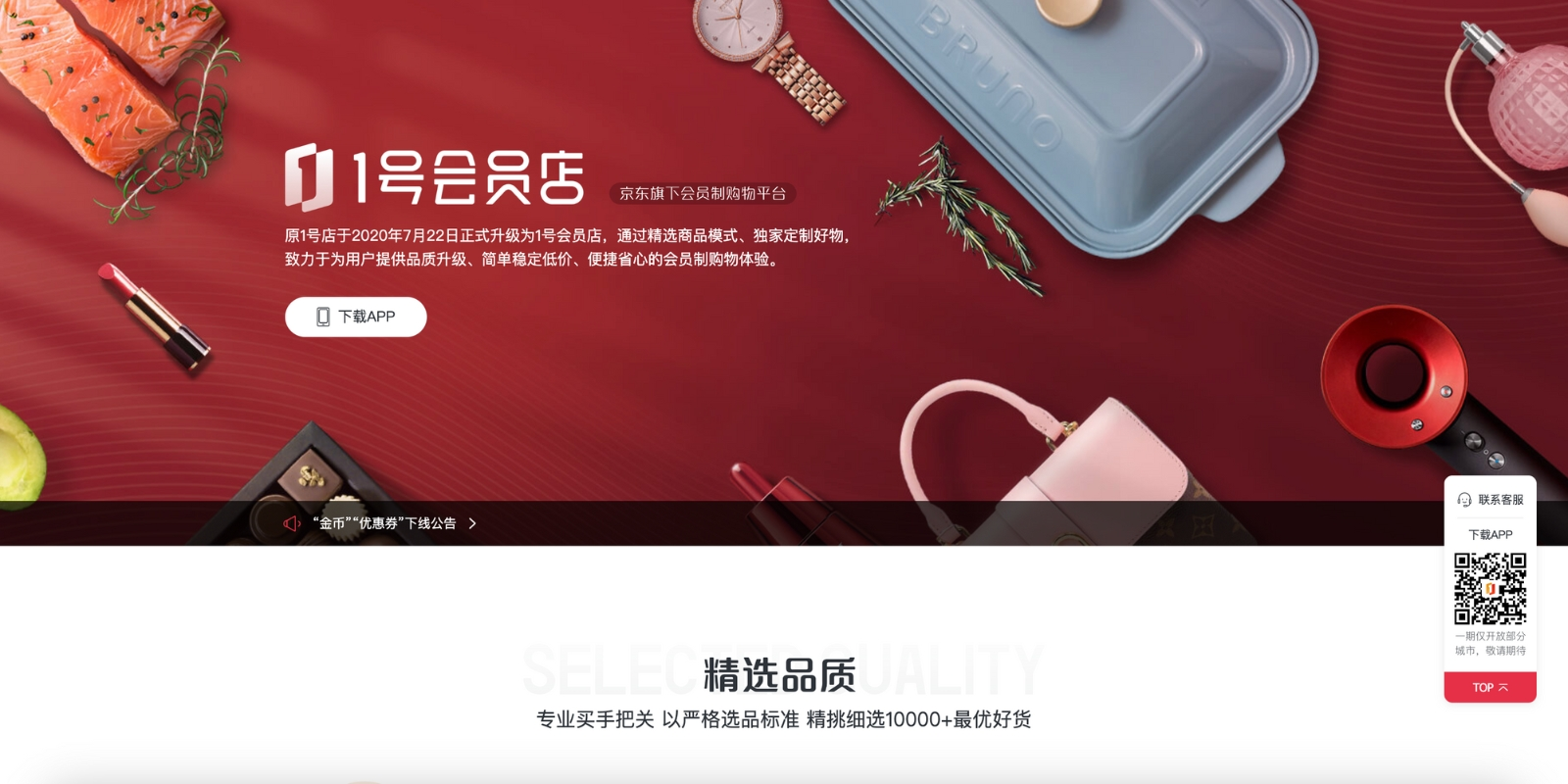
Yihaodian (translates to 'Shop No. 1') is a Chinese e-commerce company founded in July 2008 by former Walmart executive Yu Gang.
Initially, the company was an online grocery store but expanded to other product categories. In 2015, Yihaodian was acquired by Walmart. However, in 2018, Walmart sold an 80% stake in the company to Chinese retailer JD.com, and Yihaodian is now operated as a subsidiary of JD.com.
The platform is known for its emphasis on the quality and authenticity of products and its use of advanced technology and logistics to provide fast and reliable delivery to customers. The company has a strong brand reputation and a loyal customer base. Yihaodian is well-positioned to continue to grow in the Chinese e-commerce market.
12. SMZDM (什么值得买)
Website: www.smzdm.com
Monthly Active Users: No public data available.

SMZDM stands for 什么值得买 ‘shenme zhide mai,’ which translates to 'What’s worth buying.' It was founded by Sui Guodong in 2011, inspired by the success of other affiliate marketing websites in the United States.
The site quickly gained popularity among Chinese consumers, who were looking for a way to save money on their online shopping. The site combines an ecommerce space and a comprehensive ‘buyer’s guide’; users can share product reviews, coupons, and other shopping information.
SMZDM is not a direct seller of products. Instead, the site collects commissions from retailers when users click links to purchase products. This allows SMZDM to offer its users a wider range of products and services than other e-commerce platforms.
SMZDM's primary users are young, urban professionals interested in finding the best deals on their online shopping. The site is also popular among students and people looking to save money on their everyday expenses.
13. Suning (苏宁)
Website: www.suning.com
Monthly Active Users: No public data available.
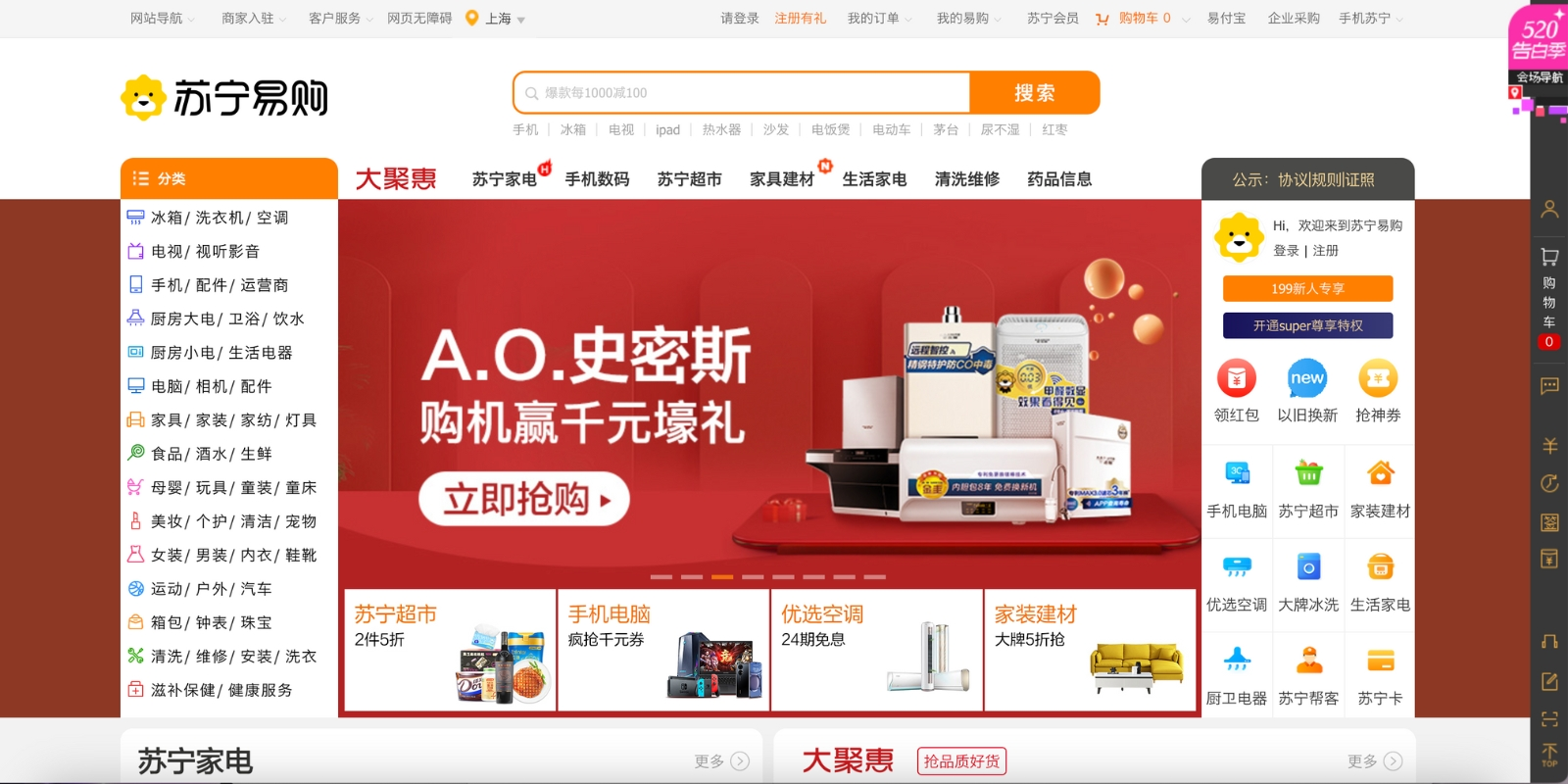
Suning is a Chinese ecommerce platform founded in 1990 as a small air conditioning sales business in Nanjing. Over the years, it expanded its business to become a large-scale retail enterprise that sells electronics, appliances, groceries, and other consumer goods.
What sets Suning apart from other popular ecommerce platforms in China is its omnichannel retail strategy and state-of-the-art logistics. The company has built an extensive network of brick-and-mortar stores across the country, enabling customers to pick up their online orders from Suning's physical stores, providing greater convenience and flexibility. In addition, Suning has been aggressively expanding its business by partnering with other companies in different industries, such as real estate and financial services, to create an all-in-one lifestyle platform.
The company has invested heavily in customer service training and technology, such as AI-powered chatbots and voice assistants, to provide customers with a seamless shopping experience. Suning also offers a "no-hassle return policy" that allows customers to return products easily and quickly. Suning has become one of China's most prominent ecommerce players, with a strong focus on customer experience, omnichannel retail, and strategic partnerships.
While the platforms previously mentioned are among the most established and dominant leaders in the industry, the following niche-focused platforms are equally significant participants in the e-commerce ecosystem:
- Freshippo: A pioneer in "New Retail" under Alibaba Group, Freshippo has revolutionized the fresh produce market through an integrated online-to-offline model. It is highly favored by the urban middle class for its ultra-efficient "30-minute delivery" and commitment to premium ingredients.
- Shihuo: As a professional shopping guide for sports and fashion, Shihuo has become the primary portal for sneakerheads and trend-focused youth. Its rigorous authentication support and price-comparison features have fostered exceptional loyalty among male consumers.
- Bilibili: A leading cultural community for the younger generation, its e-commerce arm (Member Mall) leverages content-driven advantages to focus on ACG (Animation, Comics, and Games) merchandise, event ticketing, and designer toys, successfully integrating interest-based communities with emotional consumption.
China is the largest e-commerce market in the world, and the competition among ecommerce platforms is fierce. For businesses looking to expand their reach and increase revenue, it is a highly lucrative market with immense opportunities. With the emergence of new players and significant changes to established players, understanding the leading e-commerce platforms in China is essential for brands looking to succeed in the Chinese market.
If you are looking to develop an e-commerce website or app in China, Digital Creative Asia can provide you with tailored solutions to help your brand succeed in this competitive market.
Have a project in mind?
Join our newsletter!
Get valuable insights on the latest digital trends, strategies, and developments in China and globally delivered straight to your inbox.
